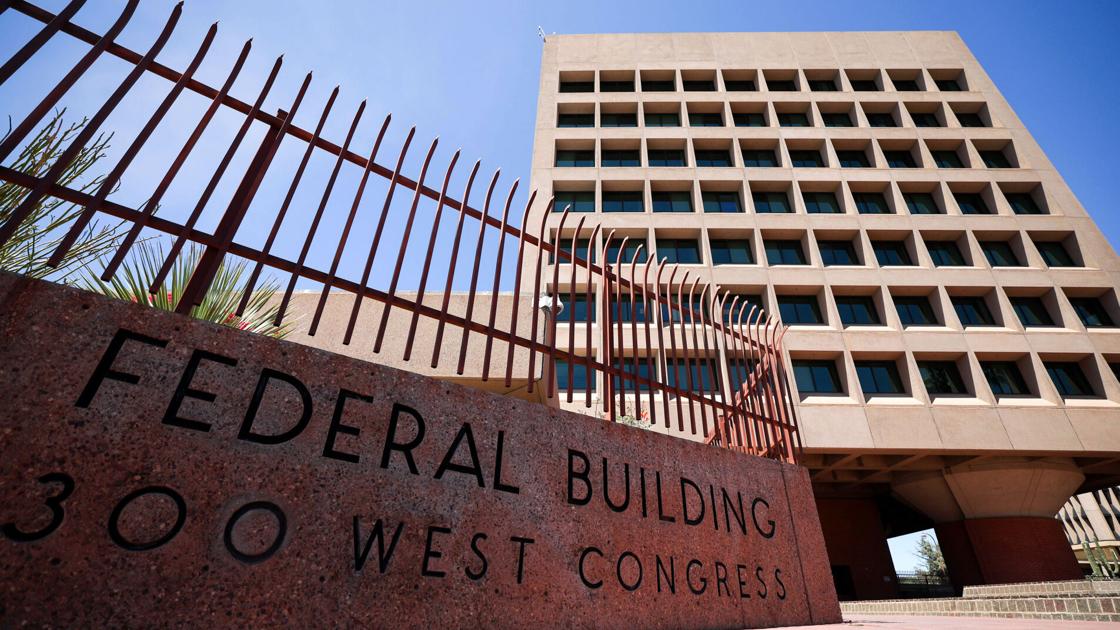
Officials from the Immigration and Customs Enforcement (ICE) have begun to detain undocumented migrants upon their exit from immigration hearings, as part of a new national strategy from the Department of Homeland Security (DHS) designed to implement expedited deportation procedures for those who have entered the country in the past two years.
According to reports obtained by Fox News Digitalthe DHS is dismissing pending immigration cases for certain migrants, as expedited deportation cannot be applied if the case remains open before a judge.
Once the case is closed —with the signature of an immigration judge— the migrant is arrested by ICE and placed in a fast removal process, which does not require an additional hearing.
Sources from ICE, who spoke on the condition of anonymitystated that a significant increase in these detentions is expected in the coming weeks.
Reversal of Biden-era policies
The measure represents a drastic change from the “catch and release” policies adopted during the Biden administration.
Officials from the DHS told Fox News that they are reinstating fast-track deportation provisions that they claim were neglected by the previous administration.
This means that even migrants without a criminal record, beyond crossing the border illegally, can be detained and expelled immediately.
Ongoing legal cases and criticism regarding due process
This policy comes as the DHS faces several lawsuits regarding its deportation practices. This week, a federal judge ruled that the Department violated a court order by deporting eight migrants to South Sudan without adequately providing them with “credible fear” interviews that could have allowed them to halt their expulsion.
Judge Brian Murphy indicated that he is considering allowing those interviews to take place in South Sudan or evaluating their return to the U.S. to reopen the process.
Context: What is expedited deportation?
Expedited removal is a legal measure that allows for the quick expulsion of an immigrant without a full hearing, as long as they have not applied for asylum or do not demonstrate a credible fear of persecution.
This tool has been widely criticized for restricting access to due legal process and for the risk of unjust or dangerous deportations, particularly in cases involving vulnerable migrants.
Cubans detained after leaving their hearings in Miami
Several Cuban citizens were detained on Wednesday by ICE agents after appearing at routine hearings in the immigration court in downtown Miami, where they hoped to make progress in their legal proceedings.
The arrests, carried out by officers dressed in civilian clothes, took place in the hallways of the court immediately after the judges dismissed their cases, in an operation that also resulted in the capture of at least two other individuals, one of whom is of Colombian origin.
Reporters from the Miami Herald witnessed how the agents positioned themselves for hours inside the building, waiting for the hearings to conclude before taking action.
The case of the first Cuban: Between the hope of residency and detention
One of the men arrested was a Cuban who had appeared before Judge Rico Sogocio.
During his hearing, the judge indicated that he needed to request a parole document as part of his process towards legal residency, based on the Cuban Adjustment Act, which allows for residency applications after one year and one day in the country.
The man explained that he had already started the process, but that he only had an I-220A form, a document that is typically handed out upon crossing the border and is not valid for applying for a “green card” under that law.
Upon leaving the room with his wife and daughter, he was approached by several ICE agents who informed him that he would be detained.
His wife and daughter, who requested to remain anonymous, told the aforementioned media outlet that the man needed medication for his diabetes and was still in the midst of his immigration process.
“He is not illegal. I want to understand,” her visibly distressed daughter said. An officer promised to call her before the end of the day to provide information, while another indicated that the detained individual would be processed at the ICE offices in Miramar.
A second case
Moments later, another Cuban man who entered through the border with Mexico in 2021 was also handcuffed.
The judge closed his case at the request of the government, putting an end to his pending asylum application.
During the hearing, the judge suggested that he hire an attorney and indicated that his case could be referred to the Office of Citizenship and Immigration Services (USCIS). However, shortly after, ICE arrested him.
Local 10 also mentioned the arrest of a young man who is only 22 years old.
“At first, when his son’s case was dismissed, his father assumed it was a positive first step toward legal residency. But the coveted pardon soon turned into a nightmare,” reported the aforementioned media outlet.
“My world has collapsed,” said the father, breaking down in tears.
The man, who requested to remain anonymous for fear of arrest, described his son as a good boy who rarely left their home in Miami, except to go to work.
“We thought that coming here was a good thing,” he said about his son’s appearance before the court.
Frequently asked questions about the expedited deportations of migrants in the U.S.
What is expedited deportation?
Expedited deportation is a legal process that allows for the quick expulsion of an immigrant without a full hearingas long as they have not applied for asylum or do not show a credible fear of persecution. This measure has been criticized for restricting access to due process and the risk of unjust deportations.
How does the new deportation policy affect Cuban immigrants?
The new policy has resulted in the detention of several Cuban citizens in the U.S., even after attending their immigration hearings. Cuban immigrants who have been in the country for less than two years and have not regularized their status are at risk of expedited deportation. Furthermore, the Cuban Adjustment Act, which allows for residency applications after one year and one day in the U.S., may not provide sufficient protection if the process has not been completed properly.
What changes have occurred in U.S. immigration policies under the Trump administration?
The Trump administration has expanded expedited deportations nationwidenot just in areas close to the border. This means that anyone without documentation, anywhere in the U.S., could be deported without going through the immigration judicial system. The measure aims to reduce government costs and ensure a stricter enforcement of immigration laws.
What criticisms have been made of the expedited deportation policies in the U.S.?
The accelerated deportation policies have been criticized by human rights organizations and immigration lawyers. It is argued that these policies violate due process and leave many individuals without the opportunity to defend their case in court. It has also been noted that accelerated deportation can endanger migrants by sending them back to countries where their lives may be at risk.



